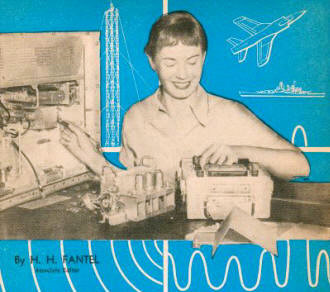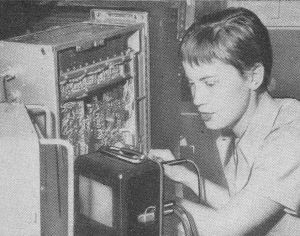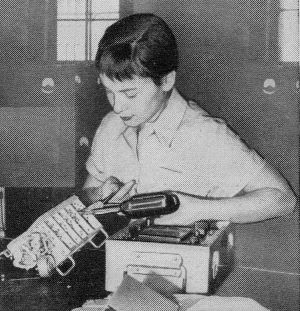A "WAVE" in Naval Electronics
|
|
Oddly, the article does not tell you the origin of the acronym "WAVES." From the U.S. Navy's history page: "After a twenty-three-year absence, women returned to general Navy service in early August 1942, when Mildred McAfee was sworn in as a Naval Reserve Lieutenant Commander, the first female commissioned officer in U.S. Navy history, and the first Director of the WAVES, or "Women Accepted for Volunteer Emergency Service". In the decades since the last of the Yeomen (F) left active duty, only a relatively small corps of Navy Nurses represented their gender in the Naval service, and they had never had formal officer status. Now, the Navy was preparing to accept not just a large number of enlisted women, as it had done during World War I, but female Commissioned Officers to supervise them. It was a development of lasting significance, notwithstanding the WAVES' name, which indicated that they would only be around during the wartime "Emergency." A "WAVE" in Naval Electronics Associate Editor A pert redhead with blue eyes flashes her winning smile from the cockpit of a Navy fighter aircraft, and reports: "Radar i.f. bandwidth okay on all stages." No, this is no Hollywood movie, but actual proof that things are changing fast for the Navy, for electronics - and for women. Proof became tangible in the form of Delores Startzel, Aviation Electronics Technician, USN. Even an "old salt" like John Paul Jones himself would have uncrusted a bit at the sight of such a charming sailor. But what would really have set him up on his sea legs is the fact that Delores has been doing an expert technical job on fully equal terms with Navy men. Her career reflects dramatically two important trends: the awakening of women to the opportunities of electronics, and their growing participation in the armed services at levels of high technical responsibility, qualified by thorough schooling. Double-Barrelled Pioneer. Both in the Navy and in the field of electronics, Delores (Dee, for short) is somewhat of a pioneer. Of course, the WAVES have been a branch of the Navy for over a decade, yet they have had to sail against the blustery headwind of male prejudice. But by now it has dawned on even the most stubborn that men have no monopoly on brains. The female breakthrough on the technical front is a relatively recent development. In the Navy Electronics Training School at Memphis, Tenn., Dee was the only girl among more than a hundred marines.
On the job, our Wave traces through the stages of an intricate receiver with a VSM-29 frequency meter. On this month's cover, Dee runs checks on an oscilloscope.
She tackles with practiced skill that ultimate of all electronic instruments - the ubiquitous soldering gun. Dee is proud to be among the first women doing advanced technical work in electronics. Like anything that smacks of engineering, electronics used to be an all-male preserve. But there just aren't enough qualified male technicians to take care of the ever-increasing variety of electronic equipment in military and civilian life. Under the pressure of this need, the old barriers of sex prejudice are now caving in. The military and private industry are no longer just looking for women with soldering irons tied to their apron strings. Now they want girls to be equally handy with the slide rule, the spec sheet, and a quick deduction from a complex schematic. Many women have the necessary keen intelligence for such work, but don't even realize it because they think of themselves as "feminine." Subconsciously they feel that having brains is like having pimples: they try to hide them or dry them up. Fortunately, the old saw that keen-minded women are unattractive no longer cuts any ice among intelligent men. Its teeth broke on the hard realities of modern life that make men and women equal partners in work and in marriage. Women who realize this no longer try to shrivel their brains. They feel free to make the most of their native intelligence and have it sharpened by thorough schooling. Electronics, since it requires more brain than brawn, seems a natural field for women's careers on the professional and semi-professional level. Dee didn't want to go to waste. She wanted to train and use her abilities. But after the first year of college, her money gave out. Instead of heading for the usual dead end of an unskilled job, Dee looked into the technical training offered by the armed services. It offered an answer to the question of her future. With a bit of pay and plenty of technical savvy stowed away, a girl would have a better toe-hold on the world. Besides paid education, Dee, who comes from a small town in the state of Washington, wanted a bit of travel and adventure - so the recruiting posters made plenty of sense to her. Always willing to take the next logical step, she enlisted. Boot Camp Ahoy! The Navy did not immediately surrender to Dee's ambition. Like all recruits, she had to steer through the military purgatory known as "boot camp." Dee maintains tactful silence about "the senseless things that come with boot," realizing that it takes a tough dose of sheer barefaced drill and discipline to fit a former civilian into the military mold. For better or worse, that's part of the bargain. As a mature and understanding person, Dee accepts this discipline in the context of military life without letting it encroach on her democratic feeling of inner freedom as a person. After boot camp, electronics was still a long way off. First came Airman Preparatory School at Jacksonville, Florida, where Dee studied flight fundamentals and aircraft maintenance, and was also trained to act in emergencies. She can handle a crash truck at disaster scenes, fight fires, and service automatic weapons. And if war ever comes to the front door, mindless of the neat distinction between combatant and non-combatant troops, communications specialist Dee can rattle off an unmistakable message in 50 caliber slugs. Electronics - At Last. After basic training and long sessions of aptitude testing and counseling, Dee was finally admitted to the Navy school for Aviation Technicians, where physics, mathematics, and basic electronic theory are ladled out in heavy doses. On the practical side, she learned the circuitry of various types of electronic gear, from simple radio receivers to complete radar systems. The biggest thrill of her electronics training was operating navigation equipment and airborne radar in actual flight, directing a plane from target to target. Later, on the job, the thorough schooling ripened into a sure knack for trouble-shooting equipment. With the great variety of electronic devices passing under her hands, Dee has had hardly a dull moment at her workbench. Sailors Ashore. Service life in this technical age is a far cry from our traditional ideas about soldiering. Looking back at her Navy career, Dee tallies up pluses and minuses and feels that she comes out well ahead in the balance. Nowhere else could she have got such a good technical education - not just for free, but actually being paid for it. Nowhere else would she have been able to learn so much so fast. No civilian job open to beginners fresh out of school would have given her the variety of electronic experience she obtained from her Navy assignment. There are off-duty gains also: meeting and making friends with people from all parts of the country and many different backgrounds has enhanced Dee's personality, giving her a wider range of human experience and understanding. "I have formed many rewarding friendships and I've learned tolerance and self-control," she says. "Many people feel that when you go into the service you lose your individuality and have to conform to a group. This is certainly true to a point. My individual desires became secondary when they conflicted with those of 40 other people. You do very little without thinking how it will reflect on the uniform you wear." Yet the dulling of the individual's outer edge is compensated for by strengthening of the core. "I feel that I am more of a person now than I was the day I joined," says Dee, "more capable of making my own decisions and standing up for what I believe in." Dee has formed a very realistic attitude about the military atmosphere pervading her work: "If you talk back to your boss in civilian life, you get fired. In the Navy, your punishment is different. That's all." Steady Ahead. After discharge, Navy electronic technicians, male or female, find the doors of the fast-growing electronics industry wide open to them. Or, using the educational provisions of the G.I. Bill, they may continue their schooling toward a formal engineering degree. Dee is steering a steady course toward her own goal: a combination of electronics and marriage. The shipmate whom she plans to sign on permanently also works in Naval electronics. When they are both back in civilian life, she wants to work in industry while he completes his engineering studies. Perhaps it seems paradoxical that the net result of Dee's Navy training is a firm foundation for civilian life. But we must remember that, after all, the purpose of the military in a democracy is not a war-like quest for "glory," but to assure the safety of the private citizen and help this troubled world gain enough peace to sustain the good of ordinary living.
Posted March 4, 2021 |
|



